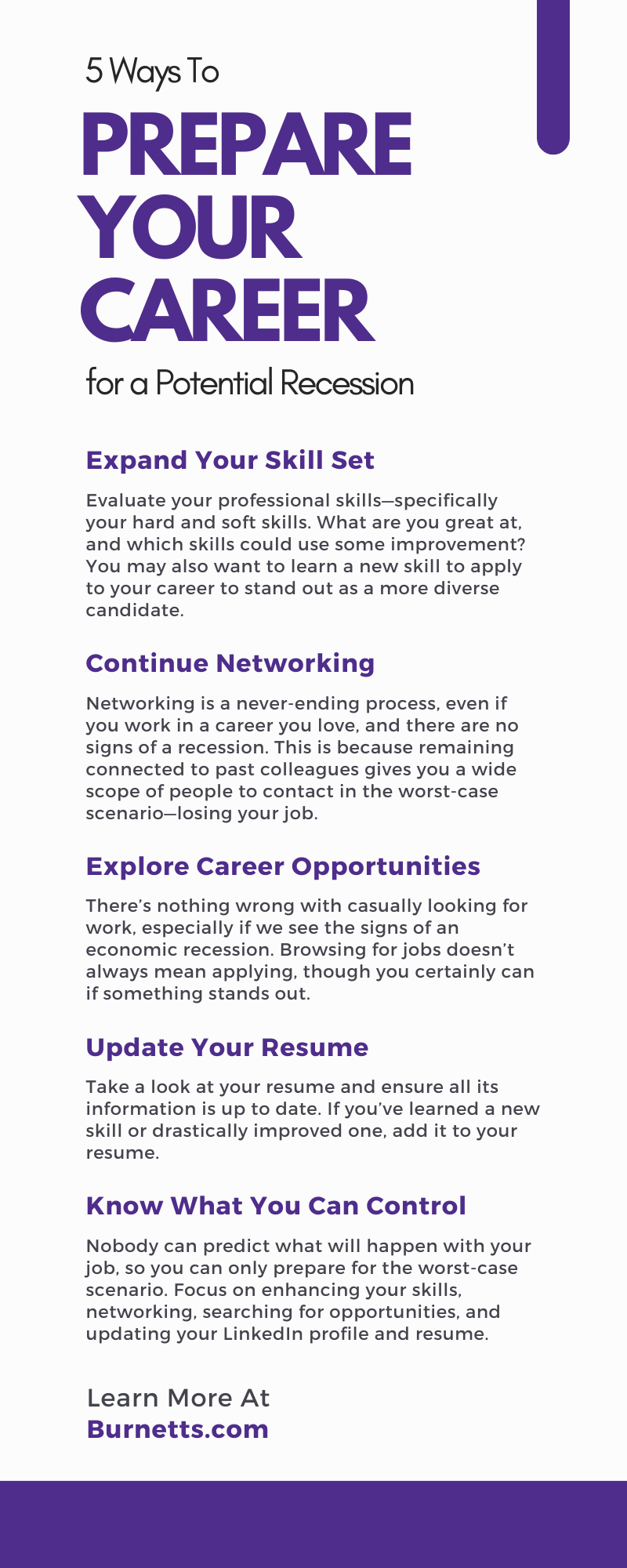
When we hear about job layoffs at our companies, stress often sets in. This level of anxiety grows if the news begins reporting about nationwide job loss. High layoff rates are a common sign of a recession, and many employees worry about the security of their jobs during such times. Utilize the tips in this guide to prepare your career for a potential recession.
Expand Your Skill Set
Evaluate your professional skills—specifically your hard and soft skills. What are you great at, and which skills could use some improvement? You may also want to learn a new skill to apply to your career to stand out as a more diverse candidate. For example, if you work in marketing, you could consider enhancing your writing and marketing skills, as you can use both to advertise to clients. However, you should consider both hard and soft skills when identifying where you can expand and improve your skill set.
Hard Skills
A hard skill is something you’ve learned either through education or experience. For example, a salesperson may learn how to use a specific company software or the formula for cold calls. Likewise, someone can teach you how to analyze data to gauge which marketing tactics work best.
Getting more experience can be challenging during a recession, but you can take a class to boost your education and gain more hard skills. Many community colleges offer a range of courses at various times, including the evening. This means you can take one or several classes in preparation for a potential recession while continuing your job.
Soft Skills
Unlike hard skills, you can’t easily teach soft skills since they relate more to how we think than how we perform a process. However, you can still develop and enhance these skills. Examples of soft skills include the following:
- Communication
- Problem-solving
- Time management
- Decision making
Some people naturally possess certain soft skills. For instance, an individual may be very decisive in all aspects of life, so decision-making comes easy for them at work. If you struggle with certain soft skills, find ways to improve them based on the issue. For example, if your communication skills are lacking, identify the reason. Are you too vague or overly blunt? Understanding how you need to work on certain soft skills makes it easier to grow.
Continue Networking
Networking is a never-ending process, even if you work in a career you love, and there are no signs of a recession. This is because remaining connected to past colleagues gives you a wide scope of people to contact in the worst-case scenario—losing your job.
Like any relationship, professional ones require nourishment. If you need to message a contact asking for a job referral, your message shouldn’t seem out of the blue for that person. Therefore, if there are people in your network who you haven’t talked to in a while, send them a text or message on LinkedIn to ask how they’re doing. Healthy connections benefit both parties, so focus on building your professional relationships.
Additionally, strive to expand your current network. You can do this by attending career fairs, taking classes, and forming new connections on LinkedIn. As with existing contacts, you should nourish these relationships and reach out to these individuals occasionally, not just when you need them.
Use LinkedIn
LinkedIn is a vital asset you need for more than just networking; you’ll also use it for marketing yourself, especially if you apply for jobs. Evaluate your current profile and try adopting the mindset of an employer. Your bio should describe your passion, current role, and specific skills, traits, and talents.
Begin by writing some background information about yourself and what got you into your line of work. From there, discuss your educational and career experiences, sprinkling in a few of your top successes. Ultimately, your profile’s bio should tell the story of your professional identity in a few short paragraphs. Keep in mind that the bio shouldn’t exceed 300 words.
Remain Active
Strive to use LinkedIn at least once a week. You don’t have to create posts or updates if you have nothing to say. Instead, show activity by liking posts related to your profession. You can also leave comments, send networking requests, or share professional articles you’ve read.
Explore Career Opportunities
There’s nothing wrong with casually looking for work, especially if we see the signs of an economic recession. Browsing for jobs doesn’t always mean applying, though you certainly can if something stands out.
Use Indeed and LinkedIn to search for potential positions to which you could submit your resume. Then, if your company announces budget cuts or layoffs, consider applying for these and similar positions.
Connect With Recruiters
Don’t wait until you’ve lost your job to search for a recruitment firm, as it’ll be harder to get in if a recession occurs. Meet with a recruiting professional to discuss your concerns and desire to start looking for work. A recruiter can also help you update your resume and LinkedIn profile and do practice interviews.
Burnett’s Staffing
Burnett’s Staffing is an employment agency serving Dallas, Fort Worth, TX, and the surrounding area. Our team of professionals can help you polish your skills and search for work to ease the stress many of us experience during an economic recession.
Update Your Resume
Finally, take a look at your resume and ensure all its information is up to date. If you’ve learned a new skill or drastically improved one, add it to your resume. Keeping this information current helps make you stand out more when applying for jobs. Also, note accomplishments you’ve achieved at your current position or educationally.
Pro Tip
If you’ve taken courses to improve specific skills, bring this up in an interview. For instance, if asked about your difficulties, explain the weakness you’ve taken classes to improve. This shows that you prioritize self-improvement.
Know What You Can Control
There are many ways to prepare your career for a potential recession. As you get ready, be kind to yourself. Getting laid off wouldn’t be your fault, but the stress you feel is natural. Nobody can predict what will happen with your job, so you can only prepare for the worst-case scenario. Focus on enhancing your skills, networking, searching for opportunities, and updating your LinkedIn profile and resume.
Work With Recruiters
Finding a new job during a recession can be stressful, especially when few positions are available. Rather than get down on yourself, work with Burnett’s Staffing. As a recruitment company, we strive to help job seekers find careers in our service area. Keep yourself prepared with help from the experts!

